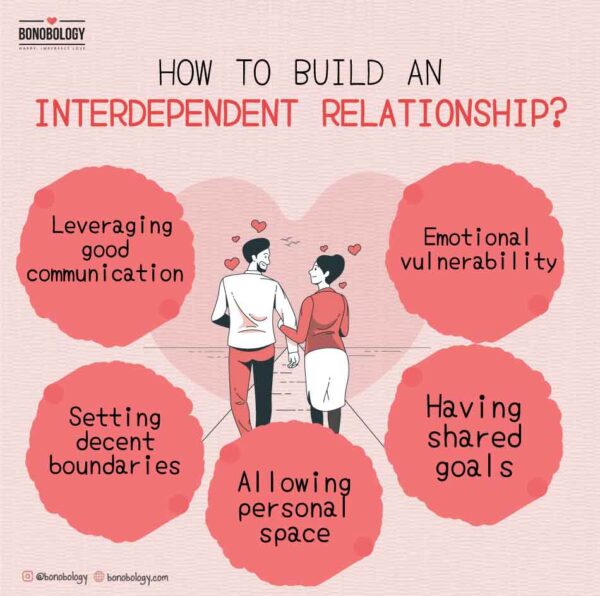However, this balancing act of building a strong relationship without losing yourself is tricky to achieve. Lean on your partner for support too much and you risk becoming co-dependent. Attach too much importance to your independence and you may come across as distant and withdrawn in your relationship. Healthy dependency between partners is the hallmark for a balanced relationship. Definitely, this is a relationship dynamic to aspire to. But what is interdependence is a relationship? What sets it apart? And most importantly, how can you cultivate it in your relationship? Let’s find out.
What Is Relationship Interdependence?
The interdependent definition – “the quality or condition of being interdependent or mutually reliant on each other” –puts the finer nuances of this relationship dynamic in perspective. When two people are in an interdependent relationship, they attach great value to the emotional bond between them but do so without sacrificing their sense of self. This means an ability to value vulnerability and cultivating a meaningful connection that allows them to thrive on an emotional interdependence. At the same time, they recognize that they don’t need their partner to make them whole. They are complete as individuals and complement each other in an interdependent relationship between partners. We are often taught to attach a great degree of value to our independence. However, a single-minded focus on being independent often stunts our ability to cultivate emotional intimacy. This can get in the way of nurturing healthy, long-term relationships. Interdependence teaches to strike a balance between our individuality and our connection with another person. Partners in an interdependent relationship neither seek validation from each other nor make demands. You have room to embark on personal pursuit without the foundation of a relationship being threatened. As such, interdependent relationships reflect the healthiest form of intimacy between two partners. So now that we’ve covered the importance of such relationships, it is essential to understand how to go from codependent to interdependent in your relationships. With the below example, let’s dive deeper into how an interdependent relationship can be forged.
What Is An Example Of An Interdependent Relationship?
Let’s say, a couple has completely opposite interests. While one loves nature and the outdoors, the other is more of a homebody. For one partner, the perfect way to unwind is to take some time off and head to the mountains for a trek. The other enjoys staying home curled up on the couch with a book, disconnected from the world. In an interdependent relationship between partners, both have the freedom to indulge in their respective ideas of rejuvenation without either of them grudging the other for it. One partner goes out for treks and hikes whenever they can find the time. The other spends a lazy weekend in the comfort of their home. There is no bickering, no relationship arguments or clashes over these diverging outlooks. Statements like ‘if only you would come with me once, you’d see what you’re missing out on’ or ‘can’t you spend even one weekend at home with me’ are not thrown around to pressure each other into compliance. Instead, they encourage each other to follow their heart and do their own thing. At the same time, focus on making the most of the time they have together.
What Are The Characteristics of Interdependent Relationships?
It is common to confuse interdependent and codependent relationships. However, the two could not be more different from one another. A codependent relationship is marked by a complete lack of boundaries, blame-shifting, ineffective communication, manipulation, controlling behavior and struggle with emotional intimacy. On the other hand, the characteristics of interdependent relationships include. So, how do I make sense of my roles and capacities in interdependent connections and relationships? Read about these characteristics, and you’ll understand what to do.
1. Robust communication
Communication, communication, communication – this is the single most effective and essential element that makes relationships grow and thrive. In an interdependent relationship, both partners can leverage communication to strengthen their bond. They express themselves clearly and honestly, listen patiently and do not play blame games. This open and straightforward communication allows them to be in tune with each other’s expectations and requirements.
2. Respect for boundaries
When there is a healthy dependency between partners, they can set and respect boundaries in their relationship. Both partners have their individual ideas, beliefs, values, ambitions and desires. They share these with complete transparency and also acknowledge the fact that their outlook on life can’t converge 100 per cent. Based on this understanding, they set different types of boundaries around the extent to which they are willing to adjust and compromise to cultivate a strong relationship without losing their individuality.
3. Personal space
Every person has their interests, passions, hobbies and desires. An interdependent relationship facilitates personal space to indulge in these. Neither partner expects to be joint at the hip with the other at all times. They are perfectly comfortable spending time apart from each other without feeling guilty. This allows them to look forward to being together again. An appreciation and acceptance of personal space in a relationship come from the understanding that another person cannot be the source of your happiness.
4. Tolerance
Like any other, couples in an interdependent relationship have their share of friction, differences and conflicts. But the interdependence psychology which is rooted in the idea of embracing each other’s uniqueness allows both partners to be tolerant toward each other. Even if one cannot understand the other’s desire or need to do something, they’re patient, compassionate and empathetic toward it. Instead of letting their differences give way to resentment, they focus on maintaining a healthy balance in their relationship.
5. Emotional interdependence
Despite being independent individuals, partners in an interdependent relationship turn to each other from emotional support. They are not afraid to share their vulnerabilities and fears. That’s made possible by the reassurance that the other person will support and lift them rather than judge and berate.
6. Growing separately yet together
As times goes by, our experiences change our outlook toward life, our goals, ambition and even the people we are. In an interdependent relationship, both partners recognize that they have their own journeys, a part of which they share. This is the main interdependent relationship vs. codependent distinction. In a codependent relationship, one partner sadly shoulders all the responsibility and focusses their energy on making the other partner grow. But in interdependent relationships, both partners retain a sense of independence yet uplift each other at the same time. This creates mindfulness which allows them to be aware of the fact that any personal changes are bound to impact their relationship dynamics. No matter how tough the going gets, this awareness and mutual trust allow them to grow separately yet together.
7. Shared goal
The key difference between interdependence and independence is that the former recognizes that while there is a ‘you and I’, there is also a ‘we’. The ‘we’ becomes a shared goal in any balanced relationship. Both partners know they can cultivate a lasting bond without sacrificing their interests and goals outside the relationship. The main interdependent relationship vs. codependent distinction lies in independence to make your own decisions but also having shared goals as partners. Instead of imposing or making decisions for someone else as it often is in a codependent relationship, in an interdependent relationship, a couples arrives to shared goals mutually.
6 Tips To Build An Interdependent Relationship
A balanced relationship that thrives on healthy dependency isn’t just handed to you on a platter. Nor is any relationship interdependent, codependent, healthy or toxic right from the beginning. It is how you develop and nurture your bond with your partner that determines what your relationship dynamics will be like. Of course, building an interdependent relationship takes consistent effort from both partners. Once you achieve it, it can be the most gratifying partnership you’ll ever experience. To help you get there, here are 6 fool-proof tips to nurture healthy mutual dependency in your relationship:
1. Know yourself well
Wondering, “How do I make sense of my roles and capacities in interdependent connections and relationships?” Well, to make any relationship truly worthwhile, the work and effort starts with your own, personal self. Often our relationship dynamics become confused and conflicted because we’re not sure of who we are and what we want from life. So, take time to understand yourself well and know what you seek in professional, spiritual, recreational and social realms of life. Then, work on building up a well-rounded existence for yourself. Yes, your relationship is an important part of your life. But it is not the be-all and end-all of life. To make your relationship interdependent, it’s crucial to be completely aware of what you want from life and build an existence that extends beyond you and your partner.
2. Cultivate other relationships
Depending on your partner to fulfill all your needs can put excessive pressure on them and vice-versa. That’s why it is imperative to have an inner circle of people you can depend on and turn to for emotional support and advice. To build an interdependent relationship, you must take time to socialize with friends, family and co-workers. This will help you embrace the fact that romantic partners don’t have to do everything together or be involved in every aspect of each other’s life.
3. Be in tune with each other’s needs
Often in relationships, one partner becomes all-pervasive and the other invisible. When this happens, you may both start viewing each other as ‘one person’. That’s when you risk being trapped in a codependent relationship. For instance, one partner may just assume that the way they conduct themselves in the relationship is completely acceptable while the other sees their behavior as problematic. But because they are not in tune with each other’s expectations and needs, this pattern goes unchecked. Healthy communication is the only way to steer clear of such traps that can get in the way of healthy emotional interdependence in a relationship. The right way to understand how to go from codependent to interdependent is about making communication a two way street. You have to consciously express yourself more but also listen ardently to your partner. Make it a habit to sit down at least once a week and talk to each other about how you feel in your relationship with complete honesty.
4. Expose fears and vulnerabilities
You cannot hope to nurture healthy emotional interdependence without letting each other see your deepest fears and vulnerabilities. Use your pillow talk time to let your guard down and confide in your partner about the things that keep you up at night. When they reciprocate, hear them out patiently and without judgment. These deep conversations help you connect on a deeper level, instil more trust and make you more comfortable with each other.
5. Pursue your goals
We all have certain goals and ambitions in life. Just because you’re in a relationship now, doesn’t mean that your dreams have become secondary. If you sacrifice all that you hold dear at the altar of your relationship, you will inevitably start resenting your partner for it. Even if, they never asked you to make those sacrifices. To cultivate interdependence in a relationship, thriving as an individual is important. So, don’t hold yourself back from aiming for what you really desire.
6. Say ‘no’ without fear or inhibition
The freedom of both partners to follow their heart is at the very core of an interdependent relationship. You cannot claim that freedom until you learn to say ‘no’ when it matters. For instance, your partner is going on a trip and they ask you to go along. You want to spend a weekend with your friends instead. If you don’t say no and let your plans be known to your partner, they will just assume that you’re on board with the plan. You may cancel your plans to accommodate that of your partner’s. But you will resent them for it on some level. Learning to make yourself heard and seen, and extending the same liberties to your partner, is the only way to make a relationship truly interdependent. Focus on making small changes, one day at a time, and turning these changes into healthy habits. With time, consistent effort and patience, you can nurture a bond of healthy dependency.




